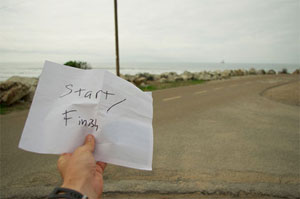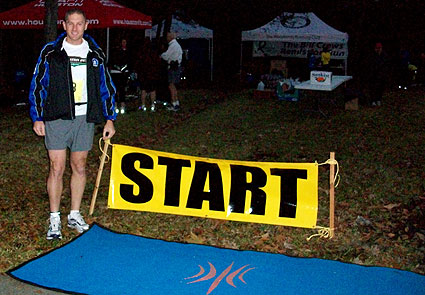Finally, I know where Operation Jack is going to end. Right here:

Now I have something to visualize!
This is where the start-finish line will be for the Operation Jack Marathon on December 26. Just in case you’ve never been here before, I’m a father of three and a marathon runner. My middle child, 7-year-old Jack, is severely autistic. I’m trying to raise money and awareness for a charity I’m a part of called Train 4 Autism by running 61 marathons this year.
It’s been tough, because I still do everything I can to spend time with my family (I watched Happy Feet with Jack this morning, read Ava three books last night and lost three times, unintentionally, to Benjamin at Uno last night), I work full time, I handle all of the logistics, and then there’s that whole “running one or two or three marathons on the weekend” thing, too.
But I can see the finish line. Literally, now. I’ve completed 52 marathons and an ultramarathon. I have nine marathons to go, and that ninth and final race will be the Operation Jack Marathon on December 26. Well, unless any of you know a potential title sponsor. In that case, the name would change! You can view all the details of the race at operationjack.org/61 or by clicking the “Marathon No. 61” link at the top of any page on this site.
Anyways, I’ve had the “pleasure” of putting together this final race. I had to find a course and Operation Jack supporter Jake Rome was kind enough to help me with that. We have one along the coast and marina at Dockweiler State Beach in Manhattan Beach and Marina Del Ray, Calif.
It’s been quite the process to obtain a permit and insurance. I’ve been through close to a dozen people in various government offices, but we’re all set. It’s going to two scenic laps of a 13.1-mile out-and-back. Half marathoners will only run once. I’m working on the medals, we’ll have aid stations and shirts for participants. There’s also going to be refreshments at the finish line.
Online registration will be available starting tomorrow. The cost is going to be $45 for the half marathon, $55 for the marathon. Reasonable for a race that includes a medal, a t-shirt, aid stations and benefits a charity? I hope so! It should be a good time. I know I’m going to be celebrating when I finish!
Operation Jack started here in Kingwood, Texas, on January 1:

Talk about starting a marathon, huh?
Now, I know where and how it’s going to end!